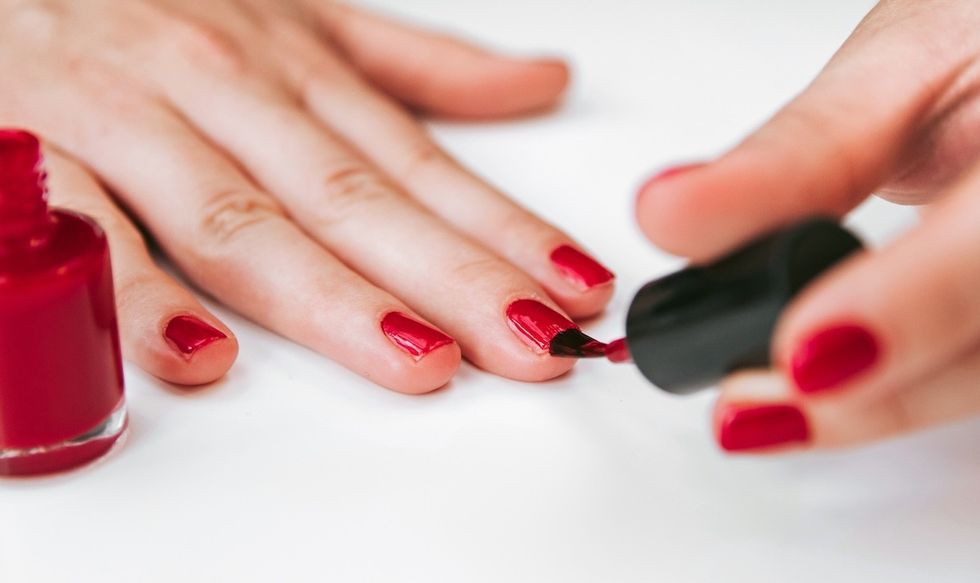By now, you’ve probably heard of PFAS, short for per- and polyfluoroalkyl substances, and commonly known as “forever chemicals.” According to the U.S. Environmental Protection Agency (EPA), there are thousands of different PFAS, and they’re found in everything from plastic kitchen utensils to food packaging.
Studies have linked PFAS exposure to certain cancers, developmental and reproductive issues, obesity, and a compromised immune system. But now, scientists are warning about phthalates, a specific group of PFAS used in perfumes, nail polishes, and hair care products. As reported by The Washington Post, phthalates have been “linked to numerous adverse health outcomes: insulin resistance, cardiovascular disease and impaired neurodevelopment.”
RELATED: There’s a Scary Reason You Might Not Be Able to Sleep at Night, New Research Reveals.
Are phthalates safe?
The U.S. Food & Drug Administration (FDA) defines phthalates as “chemical compounds developed in the last century that are used to make plastics more durable.”
In cosmetics, they can help prevent nail polishes from cracking, enable the hold of hairspray, and “function as solvents and stabilizers in perfumes and other fragrance preparations,” the FDA notes. They may also be found in aftershave lotion, shampoo, and other cleansing products.
According to a 2010 survey by the agency, Diethyl Phthalate (DEP) is “the only phthalate still commonly used in cosmetics,” but the FDA “does not have safety concerns with the use of DEP as currently used in cosmetics and fragrances.”
However, according to the Vermont Department of Health, “DEP is classified as a category 1 endocrine disruptor that affects the reproductive system.”
Additionally, six other phthalates are included in California’s Proposition 65, a law that requires products sold in the state to have a published “list of chemicals known to cause cancer, birth defects or other reproductive harm.”
RELATED: New Laws Could Ban Gatorade, M&M’s, Froot Loops, and More Popular Snacks.
Why are experts concerned about phthalates?
As The Washington Post shares, studies have linked phthalate exposure to impaired cardiovascular health, prenatal neurological effects, and an increased risk of obesity, insulin resistance, and diabetes.
In adolescents, phthalates have been tied to increased ADHD-related behavior problems and poorer academic performance in math.
The fact that phthalates are considered endocrine-disrupting chemicals (EDCs) is also extremely concerning. EDCs “may mimic, block, or interfere with the body’s hormones, which are part of the endocrine system,” explains The National Insitute of Environmental Health Sciences (NIEHS). “These chemicals are associated with a wide array of health issues.”
Disruptions to the endocrine system can affect the reproductive system and fertility, metabolism and weight, and thyroid function. According to the NIEHS, EDCs have also been linked to certain cancers and neurodevelopmental issues.
RELATED: “Teflon Flu” Cases Are Spiking—Is Your Cookware Making You Sick?
How can you avoid these chemicals?
In speaking with WaPo, Andrea Gore, PhD, a professor of pharmacology and toxicology at the University of Texas at Austin, whose lab studies EDCs, said, “I recommend avoiding added fragrances altogether—in perfumes, scented lotions and shampoos, even scented detergents and antiperspirants.” Particularly, she advises families with young children and those looking to get pregnant to limit their exposure.
Since the FDA does not “require the listing of the individual fragrance or flavor, or their specific ingredients,” a product will not specify whether or not it contains phthalates. Therefore, the agency says to “choose products that do not include ‘Fragrance’ or ‘Flavor’ in the ingredient declaration” if you wish to avoid these chemicals.
Some products, however, may note that they’re free of phthalates and parabens.
When it comes to nail polish, you should also look for nontoxic options that are free of phthalates, as well as other harmful ingredients like formaldehyde.
RELATED: Are Plastic Cutting Boards Safe? Here’s What New Research Shows.
The Takeaway
Some argue that there is inconclusive research to determine whether or not phthalates are harmful to humans since much of the data is derived from animal studies. But Gore says, “If a chemical has endocrine disrupting effects in animals, there is exceptionally high certainty that this is also the case in humans.”
“The hormones of the endocrine system are structurally and functionally similar, if not identical, in nonhuman and human animals,” she added.
Moreover, the WaPo reports that “a 2023 study of 41 women found that after 28 days of switching to phthalate-free and paraben-free products, they not only had reduced levels of these chemicals in their urine, but also had reductions in gene expression associated with cancer in their breast tissue.”
If you’re concerned about phthalates in your cosmetics or beauty products, opt for the fragrance-free option.

